The Robotics Society is a student-led society which aims to encourage students of all levels to get involved in robotics. Since 2013, the Robotics Society offers a great opportunity to develop your practical skills outside of the course curriculum; you’ll be able to build exciting projects with state-of-the-art technology in a relaxed environment.
More importantly, it’s a great chance to meet others who are interested in robotics. The society is open to students from across the university, at all study levels. Take a look at the projects we run!
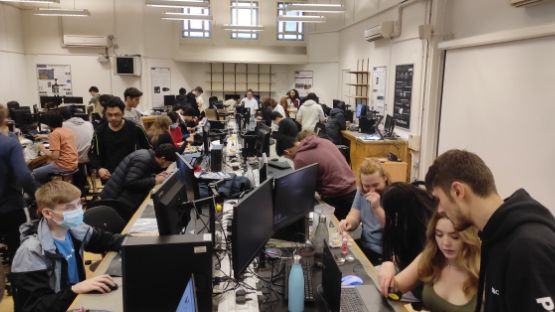
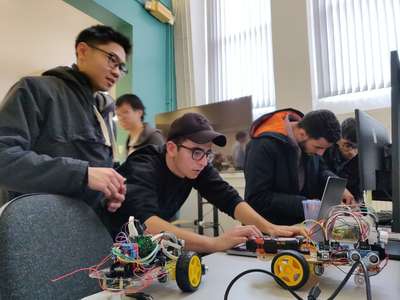
The Buggy Project is our primary beginners project. New members are put into teams of 2 or 3 people and each team gets a kit to assemble their own two wheel autonomous buggy.
The buggies are assembled over the course of semester 1 and the students are taught the basics of circuitry, programming and mechanical considerations for robotics along the way. We like to invite the members to put their own spin on their creations, and several buggies feature weird and wonderful modifications.
The semester closes with a competition where all the buggies compete to solve mazes, race each other, and other tasks. This year we had 36 participating students in the final competition and it was a huge success!
After the competition, buggy project students can move up to other projects, or continue to tinker with and upgrade their buggies if they want to explore other technologies.
A number of last semester's buggy teams are now experimenting with bluetooth control via mobile apps of their own design, and some are working on mapping and navigation technologies.
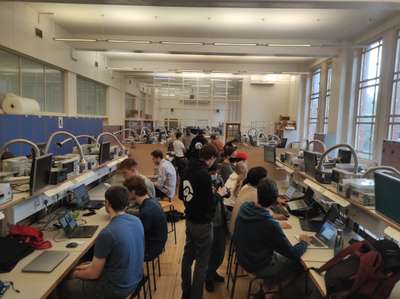
The goal of the Arm Project is to develop software which will enable one of the Society's 6 DOF manipulators to play chess against human opponents on a physical chess board.
To this end the team has sub-groups focussed on trajectory planning algorithms, low level hardware interfacing, computer vision to identify pieces in a camera feed and artificial intelligence to choose the best moves for the robot to make.
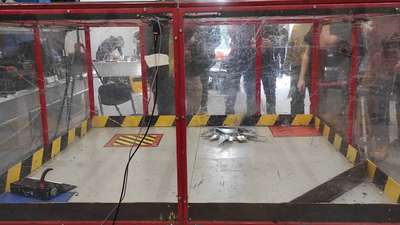
This project team is working to build a variety of combat robots to participate in Robot Fighting competitions around the UK (think Robot Wars, but a bit smaller).
This year we successfully took part in a Beetle Weight (<1.5 kg) competition in Bristol in February which was the first event of this kind that the university has ever taken part in.
In March we also entered two hobby weight (<5.44 kg) robots into the National University Robot Fighting League in Leeds, where one of our robots made it to the quarter finals and we won an award for the best engineered robot. We are also hoping to host our own internal fighting event later this academic year.
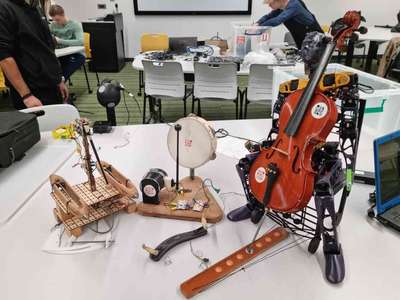
The Robot Orchestra began in 2016 under the leadership of Professor Danielle George, with its stated goal being “to enthuse young people about engineering and music by encouraging their creativity and passion for making”. Leadership passed to the Robotics Society in 2022.
At the time of writing, we possess 16 functioning robot instrumentalists, with 8 additional players in various stages of design/construction. These range from violins and pianos to tesla coils and floppy disks, which help to give the Orchestra a unique robotic sound. Wherever possible we try to avoid synthesisers and other electronic means of making sound, preferring to play the instruments the way a human would: by actually pressing keys and plucking strings.
The project is highly interdisciplinary and welcomes anyone interested in music, software, mechanical design, or electronics. Students interested in the engineering side who have little or no musical experience need not worry, as there will be musicians involved in the project to help on this front. We also welcome musicians (who need not have any prior robotics experience) to arrange/compose for the orchestra and help steer the engineers in the right direction.
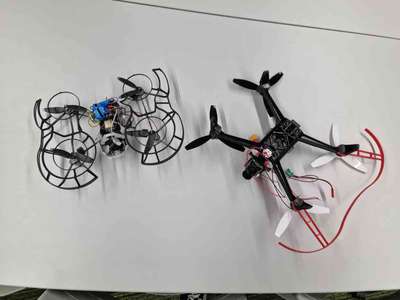
The Artemis II is a project undertaking the development and construction of a fully autonomous hex-copter. The project will heavily utilize flight dynamics simulations, RF antenna design, high-power hardware design and many more. This year by using the Pixhawk 4 flight controller.
With the ArduPilot software, our team will construct a GPS-guided hex-copter which will be able to do half-hour waypoint missions and areal photography. This project is ideal for people who want to push the physical limit of fundamental electronics and are interested in developing and learning the amalgamation of all engineering disciplines.
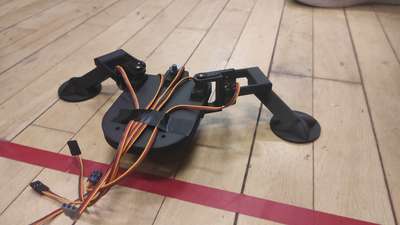
In addition to the more structured projects above, the society also allows experienced members to propose their own small projects which we fund and support.
This year we have a number of promising bespoke systems including projects to construct an object-tracking camera, two quadrupeds and a robot spider!
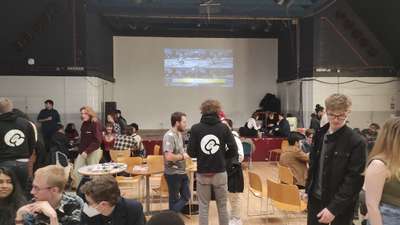
We run a variety of activities designed to build community and to educate. We've run visits to the NQ64 arcade, Pub Quiz nights, Games nights, and hosted a successful 24-hour hackathon event!
We have run a number of talks and workshops in the past year to give our members skills and experience which are not provided by their courses. These include:
If you would like to find out more, please email us at info@uom-robosoc.com
Or follow us on some of our social media channels here.